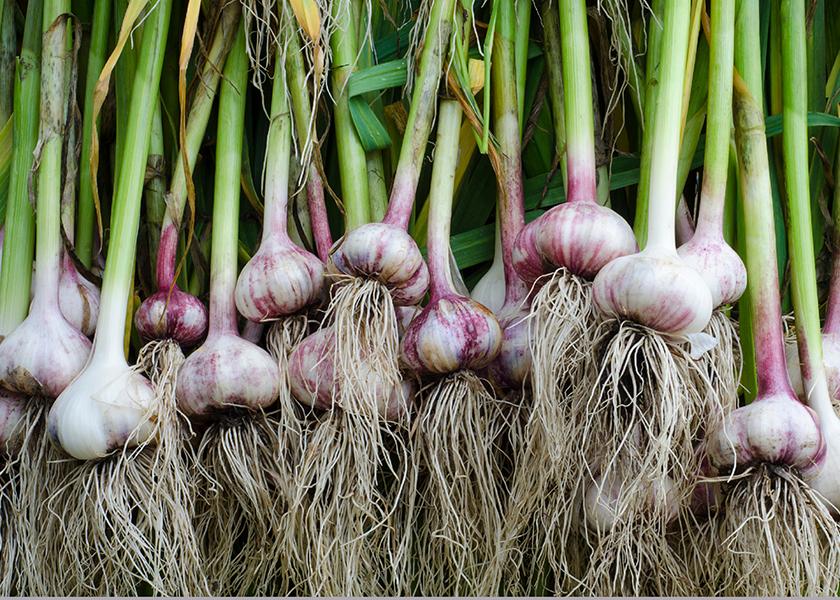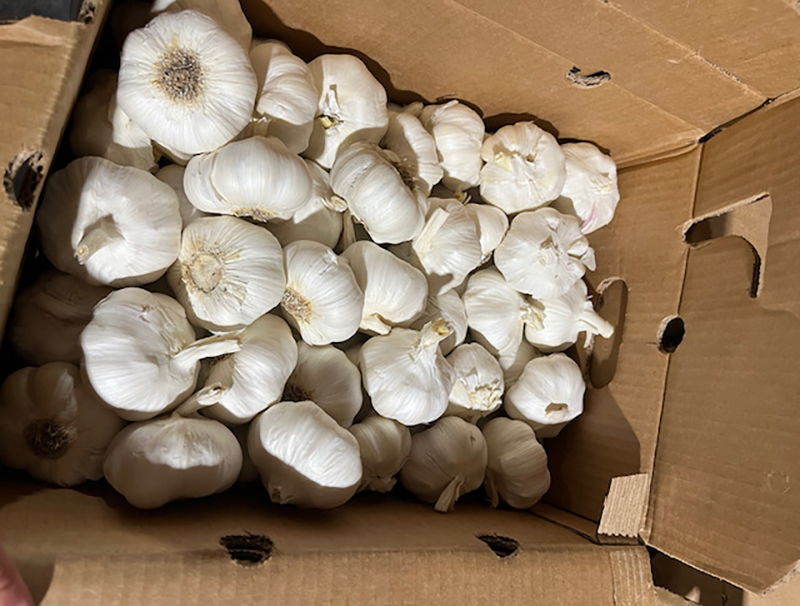Garlic market conditions finally favorable for domestic growers

For domestic growers and importers supplying year-round garlic to customers, the key to success with garlic is twofold.
Not only is it critical to harvest, cure and store the allium to ensure a high-quality crop, but it’s also essential to manage market conditions strategically as global import markets play a critical role in whether a producer yields a profit for the product.
Garlic suppliers have seen markets fluctuate over the past several years, dealing with unexpected demand and supply chain issues through the pandemic and subsequent inflationary conditions. In 2023, markets are finally looking favorable.
“We’re cautiously optimistic about this season with California garlic,” Kain Fattahi told The Packer. Fattahi manages operations at the family-owned and operated Global Farms based in Los Angeles.
China and Spain are seeing reduced garlic exports this year, he said. China’s harvest is reportedly down this season compared with years prior. That, combined with a roughly 30% reduction in Spain’s acreage, translates to promising conditions for domestic garlic, Fattahi said.
“We’re probably not going to see as many imports [in the U.S.], and so that should support the California market this year,” he added.
Global Farms experienced a boom of demand during the pandemic, Fattahi said.
“The last couple of years, prices were really depressed on imports because Spain, Argentina, Mexico and China had just planted a lot of garlic. We saw a lot of cheap prices from those countries,” he said. “In California, the costs are what they are; you can’t expect to compete with a lot of those imports.”
Many growers in garlic-exporting countries chose not to replant. The reduced acreage, combined with weather issues, has led to an overall shortage on imports, Fattahi added.
Andy Martin, president of A&A Organic Farms based in Watsonville, Calif., sees similar trends unfolding this summer.
“Both Spain and China have seen weather issues that have affected imports recently,” Martin told The Packer. “Spain, in particular, has had issues with rain, which has affected both quality and volume.”
All in all, the markets look stable in the months ahead, Martin said.
In addition to favorable markets, Martin is looking forward to seeing A&A Organics’ newest garlic program from Mexico come to fruition after several years in the making.
As part of the new program, the grower just planted purple garlic seed for next year’s harvest. A&A Organics sources its organic white garlic crop from California, Mexico and Argentina.
“It’s steady as she goes,” Martin said. “Our Argentinian crop in particular is drop-dead gorgeous and runs like clockwork.”
Challenges on the horizon
For producers trying to break into garlic production, it can take a while to get established.
“Produce House is still relatively new to marketplace with three seasons under its belt and [we] have found that this market is intimate,” Raquel Espinoza told The Packer. Espinoza leads sales and marketing for Nogales, Ariz.-based Produce House, which has recently added garlic to its growing produce portfolio.
“We are starting to understand its dynamic and will continue to grow into this category in the future, always maintaining food safety [as] a priority as we market our products,” she said.
Espinoza is optimistic that the company will soon establish its position as a certified organic garlic grower sourcing from Mexico.

“It’s our goal to work with our national market here in the United States and grow into all North America,” she said. “It is in our plans to grow global in the next five years with this commodity.”
Another persistent challenge for many bringing garlic to market is the cost of labor, especially for domestically grown product.
“Here in California the cost of labor is really the unknown factor,” said Fattahi at Global Farms. “We don't we don't see it going down anytime soon. It’s tough competing against a lot of these imports with the cost of labor in California,”
While Global Farms hones the efficiency of harvest and the operation as much as possible, the cost of labor in the Golden State remains a hurdle.
“The fresh market is all hand-harvested and no one's developed any other way to harvest the garlic,” Fattahi said. “The bulbs are pretty delicate. It all has to be harvested by hand.”







